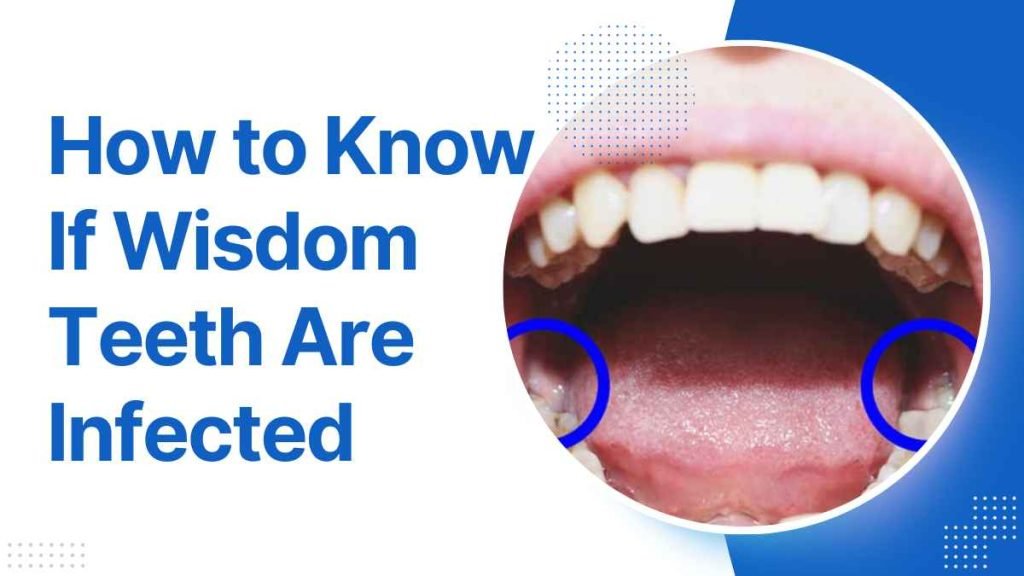How to Know If Wisdom Teeth Are Infected! Ah, the mysterious ways of wisdom teeth – those late-blooming dental companions that often bring more pain than wisdom. If you’ve been wondering about the discomfort in the back of your mouth, you might be dealing with infected wisdom teeth. But fear not! In this comprehensive guide, we will explore How to Know If Wisdom Teeth Are Infected. Here we’ll unravel the secrets behind wisdom teeth infections, how to recognize them, treat them, and even prevent them. So, let’s dive in and decode the signals your mouth might be sending you.
Table of Contents
What Are Wisdom Teeth?
Before we embark on our wisdom teeth infection journey, let’s understand what wisdom teeth are. Wisdom teeth, also known as third molars, are the last set of molars located at the back of your mouth. These latecomers usually emerge between the ages of 17 and 25, a time often referred to as the “age of wisdom” – hence the name.
How to Know If Wisdom Teeth Are Infected
Feeling an ache or pain in the vicinity of your back molars? That persistent discomfort might be a sign of an infected wisdom tooth. Watch out for symptoms like swelling, redness, throbbing pain, or even a bad taste in your mouth. Difficulty in opening your mouth fully or foul breath could also indicate an infection. If you’re experiencing any of these, it’s time to consult your dentist.

What Are the Symptoms and Signs of a Wisdom Tooth Infection?
- Persistent Pain: A constant, throbbing pain in the back of your mouth is a telltale sign.
- Swelling and Redness: Inflammation and red gums around the affected area indicate an infection.
- Difficulty in Opening Mouth: Limited jaw movement due to pain and swelling.
- Bad Taste and Bad Breath: Foul taste or breath caused by pus drainage from the infected area.
- Swollen Lymph Nodes: In some cases, you might notice swelling in your neck or under your jaw.
What Are the Causes of Wisdom Tooth Infections?
Wisdom teeth infections occur primarily due to impaction, where the tooth doesn’t have enough space to grow properly. This cramped space makes cleaning difficult, leading to the accumulation of bacteria and debris. As a result, infections, swelling, and pain can occur around the impacted tooth.
How to Treat an Infected Wisdom Tooth
- Pain Relief: Over-the-counter pain relievers can help manage the discomfort.
- Antibiotics: Your dentist might prescribe antibiotics to clear the infection.
- Warm Salt Water Rinse: Gargling with warm salt water can reduce inflammation.
- Dental Cleaning: Professional cleaning to remove debris and bacteria.
- Surgical Extraction: In severe cases, surgical removal of the wisdom tooth might be necessary.
How to Prevent Wisdom Tooth Infections?
Prevention is the key to avoiding the agony of an infected wisdom tooth. Regular dental check-ups, proper oral hygiene, and timely removal of impacted wisdom teeth, especially if they are causing pain or discomfort, can prevent infections.
Common Mistakes to Avoid
- Ignoring Pain: Don’t dismiss persistent pain; it might be your body’s way of indicating a problem.
- Delaying Dental Visits: Regular dental check-ups can catch issues early, preventing complications.
- Neglecting Oral Hygiene: Brush, floss, and use mouthwash regularly to keep your mouth clean.
- Self-Diagnosis and Treatment: Consult a dentist for proper diagnosis and treatment; self-medication can worsen the situation.
Tips and Tricks
- Ice Packs: Applying ice packs can help reduce swelling and numb the area.
- Soft Diet: Stick to soft foods to avoid putting pressure on your jaw.
- Proper Oral Hygiene: Clean your teeth and gums meticulously, especially around the wisdom teeth area.
Facts About Wisdom Teeth Infections
- Wisdom teeth infections are common among young adults due to the late eruption of these teeth.
- Wisdom teeth can be impacted, meaning they don’t fully emerge, leading to infection risks.
- Smoking and poor oral hygiene increase the likelihood of wisdom tooth infections.
Conclusion
In conclusion of How to Know If Wisdom Teeth Are Infected, navigating the signs of wisdom teeth infections might seem perplexing, but armed with the right knowledge, you can decode the mystery. Remember, early detection, regular dental visits, and proper oral hygiene are your allies in the battle against wisdom teeth infections. Listen to your body, consult your dentist, and keep that smile healthy and pain-free! Here you can checkout that How to Make Fake Teeth with Household Items.
FAQs About How to Know If Wisdom Teeth Are Infected
Can wisdom teeth infections go away on their own?
Rarely. Infections often worsen without proper treatment and might lead to complications.
How long does it take to recover after wisdom tooth extraction?
Recovery time varies, but most people resume normal activities within a few days to a week.
Are all wisdom teeth removed?
Not necessarily. If wisdom teeth grow properly, don’t cause pain, and are cleanable, they might not need removal.
Can wisdom teeth infections cause ear pain?
Yes, infections can radiate pain to nearby areas, including the ears.
Is it safe to ignore mild pain around wisdom teeth?
No, even mild pain can be a sign of an underlying issue. It’s best to consult a dentist.
Are wisdom teeth extractions painful?
Dentists use anesthesia during extractions, ensuring the procedure is relatively painless. Post-operative discomfort is manageable with medication.
Can wisdom teeth infections cause headaches?
Yes, infections in the back of the mouth can cause referred pain, leading to headaches.


